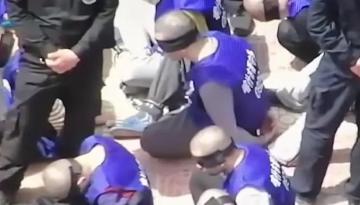Chinese officials were instructed in 2017 to deport or detain two suspected New Zealanders flagged by a mass-surveillance programme as part of China's crackdown on Uighurs in the Xinjiang province, according to leaked documents.
Last week, a raft of classified Chinese Government documents were leaked, providing insight into the Communist Party's secretive concentration camps believed to hold at least a million Muslim Uighurs.
The documents, revealed by the International Consortium of Investigative Journalists and called the "China Cables", have been verified by several linguists and experts, but rubbished by the Chinese Government.
Former detainees have spoken of torture, rape and brainwashing at the camps in the country's west, with the Government wanting to force the prisoners to reject their faith and customs. People are placed in the camps for crimes as minor as praying or downloading messaging apps.
But China has repeatedly rejected such accusations, saying the camps are for vocational education and counter-terrorism operations.
Among the files - which highlight how the camps were run - was a confidential "bulletin" from June 2017 about "backflow prevention".
It detailed how a mass surveillance programme - known as the Integrated Joint Operations Platform (IJOP) - screens the population and identified more than 1500 people from Xinjiang that had obtained a foreign nationality and later applied for a Chinese visa. China does not allow dual citizenship.
Seventy-five of the identified individuals were believed to be in China at the time. Two of these individuals were "from New Zealand", according to the document.
It goes on to call for local officials to use their "forces" and the mass-surveillance programme to verify the individuals' identity.
People who haven't cancelled their Chinese citizenship and "for whom suspected terrorism cannot be ruled out" were to be put into the concentration camps to be "examined".
"Personal identification verification should be inspected one by one, for those who have already cancelled their [Chinese] citizenship and for whom suspected terrorism cannot be ruled out, they should be deported; for those who haven't cancelled their [Chinese] citizenship yet and for whom suspected terrorism cannot be ruled out, they should first be placed into concentrated education and training and examined," the bulletin says.
New Zealand's Ministry of Foreign Affairs and Trade (MFAT) says it has no information suggesting any Kiwis are currently detained but did not rule it out.
When asked about the leaked document's reference to Kiwis, Prime Minister Jacinda Ardern said she couldn't speak to any individual cases, but stressed she had privately raised human rights with Chinese President Xi Jinping during a trip to China earlier this year.
New Zealand, along with 21 countries including Japan, Australia, Canada and the UK, also issued a joint statement in July condemning the Xinjiang detention centres.

The Chinese Embassy in New Zealand told Newshub that media had been "enthusiastic in making rumours about Xinjiang" and foreigners "with an objective and fair mind" were welcome in the region.
A spokesperson said between 1990 and 2016, there had been violent incidents in the province resulting in "heavy casualties and property losses".
But since "Xinjiang lawfully fought violent and terrorist crimes" and addressed root causes, it hadn't seen a violent incident.
"Instead of hyping up Xinjiang-related issues with despicable lies, these people should give up bias and do some real things to help people know more about Xinjiang."
Kiwi expert on China Anne-Marie Brady told Newshub it would be "extremely concerning" if New Zealanders were detained.
"The New Zealand government must also continue to speak up about the camps, joining with other governments to do so. International pressure on China can make all the difference on human rights cases," she said.

A Kiwi Uighur Newshub spoke to said he wasn't aware of any Kiwis in China that may have been caught up in the crackdown, but said he wasn't surprised by the revelations.
The man - who Newshub has decided not to name - moved to Australia from southern Xinjiang in the late 1990s. He now has Australian citizenship but moved to work in New Zealand nearly three years ago.
His story is similar to other Uighurs with relatives still living in Xinjiang. He avoids communicating with his family extensively as that could get them in trouble with local authorities. He said police have previously attended their home after they spoke to him.
The man said anyone with an overseas passport was seen by the Chinese Government as a "target" and that China blamed overseas Uighurs for stirring up trouble with foreign Governments.
He wants the Australian and New Zealand Governments to do more to speak up for their rights. While he respects the Governments need to maintain a healthy relationship with China, he says human rights should be at the forefront of their thinking.
"[I'm] absolutely frustrated... this is an issue. We are humans".
Among the information revealed by the China Cables is the intense control officials have over those in the camps. A manual discusses how officials should indoctrinate the detainees, how to keep the camps secret and how to stop anyone escaping.
IJOP collects information from a range of sources, such as CCTV cameras and spyware on phones. Other foreign nationals identified in the bulletin include 23 Australians, 26 Turkish nationals and three Americans.

Satellite imagery has shown rapid growth in camps across the Xinjiang Province, with over two million new square metres added since the beginning of 2017.
The United States hit out at China earlier this year over human rights violations, restricting some Chinese organisations from working with American businesses and imposing visa restrictions on some Chinese Government and Communist Party officials.



